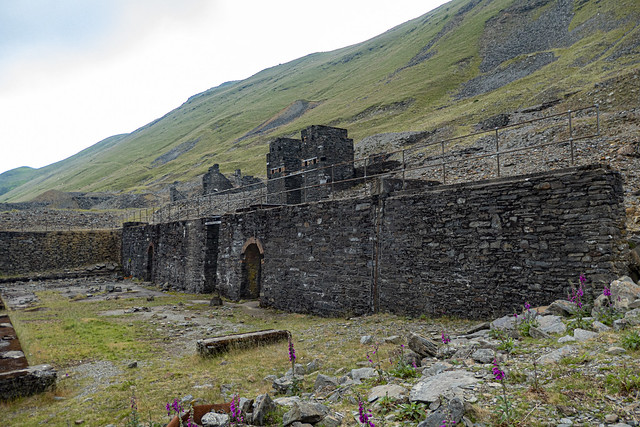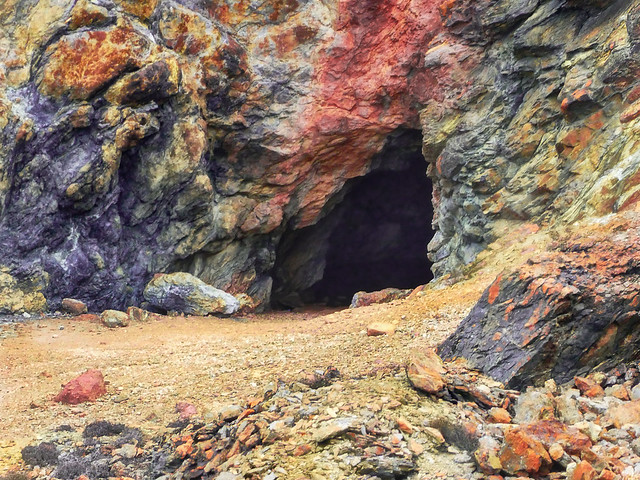Today we’re looking at the words for lead (metal) and related things in Celtic languages.

Cwmystwyth Lead Mine, Ceredigion, Cymru
| Proto-Celtic | *ɸloudom = lead (metal) |
|---|---|
| Gaulish | *laudon = lead (metal) |
| Old Irish (Goídelc) | lúaide = lead (metal) |
| Irish (Gaeilge) | luaidhe [ˈl̪ˠuːiː] = lead (metal), (sounding-) lead, plummet, (fishing) sinker luaidhiúil = lead-like, leaden luaidhnimh = lead-poisoning peann luaidhe = pencil |
| Scottish Gaelic (Gàidhlig) | luaidhe [l̪ˠuəjə] = lead (metal), leaden luaidheach = leaden peann-luaidhe = pencil |
| Manx (Gaelg) | leoaie = lead (metal), leaden, sounding lead penn leoaie = pencil |
Words marked with a * are reconstructions.
Etymology: from the Proto-Indo-European *plewd- (to fly, flow, run), from *plew- (to fly, flow, run), from the Proto-West Germanic *laud [source].
Some words from the same PIE root include fleet, float, flood and pneumonia in English, vlieten (to flow) in Dutch, fließen (to flow) in German, flyte (to float, flow) in Swedish [source].
The English word lead comes from the Middle English le(e)d (lead) from the Old English lēad (lead) from the Proto-West-Germanic *laud (lead), from the Gaulish *laudon (lead) [source], and words for lead in other Germanic language languages come from the same root [source].
| Proto-Brythonic | *plum = lead (metal) |
|---|---|
| Middle Welsh (Kymraec) | pluum, plwm = lead (metal) |
| Welsh (Cymraeg) | plwm [plʊm] = lead (metal); mass or ball of lead, plumb, plummet, straight(ness), vertical(ness) plymaidd = leaden, lead-like, heavy, oppressive, worthless plymen = lead weight, plummet, sheet, of lead plymio = to sound (for depth), fathom, dive, plunge, plummet; to cover or solder with lead, line (pottery) with lead, glaze plymwr = plumber, dealer/worker in lead, plunger, diver plymliw = lead-coloured, blackish-blue, greyish blue, pale blue |
| Cornish (Kernewek) | plomm, plobm = lead (metal) plommer = plumber plommwedhek = vertical pyncel plomm = pencil |
| Breton (Brezhoneg) | plom = lead (metal) plomek = lead(en) plomer = plumber plomerezh = plumbing |
Etymology: from the Latin plumbum (lead, pencil), may be borrowed from Etruscan, Iberian or some other pre-Indo-European Mediterranean substrate language [source].
Some words from the same Latin root include plumb (truly vertical, as indicated by a plumb line) in English, piombo (lead, grey, bullet) in Italian, plomb (lead, fuse, sinker) in French, and Plombe (seal, filling) in German [source].
Sources: Wiktionary, Am Faclair Beag, Online Manx Dictionary, Teanglann.ie, eDIL – Electronic Dictionary of the Irish Language, In Dúil Bélrai English – Old Irish glossary, Geiriadur Prifysgol Cymru, Gerlyver Kernewek, Gerlyvyr Cernewec, Dictionaire Favereau, TermOfis, Le dictionnaire diachronique du breton, Geriafurch, English – ProtoCeltic WordList (PDF), Etymological Dictionary Of Proto Celtic





